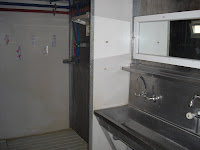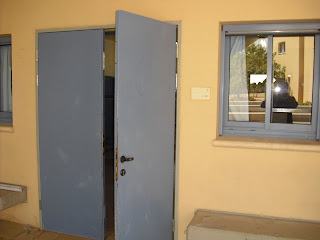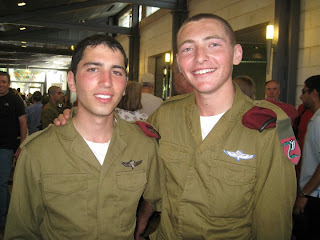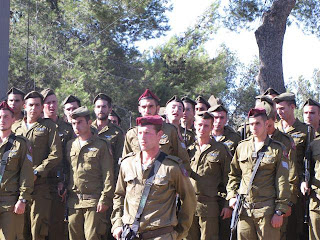A year ago I followed my dreams and made aliyah; arriving to kibbutz Ortal with a garin of young zionists from all over the world. For three and a half months, we bonded together as a group, travelled the country, learned hebrew in ulpan and went through some early army processes, like Gadna and Tsav Rishon. Then in November, we all enlisted into the army, each one going to a different place. For me, after passing the gibush, I joined the legendary Israeli Paratroopers' brigade and started basic training in early December. My time in the army has been significant to say the least; from the swearing-in ceremony at the Kotel and jumping out of a plane five times, to war week and the gruelling masa kumta. The climax of everything, however, was when my parents surprised me at my tekes kumta and were there to see me get my red beret. Since that memorable day I have joined up with the rest of my battalion and am currently doing training in the North under the title of 'Rabat' (corporal!!!). That is basically is a quick sum up of my year, but luckily I can always look back at a more detailed version, thanks to the blog...

Nine months of hard work in the army and this is what I have to show for it - the tzanchanim shoulder tag, the wings and, of course, the red beret!!!
Before leaving London, I decided to write a blog, in order to keep both family and friends updated with my doings, but also as a little project for myself. As the year has gone on, however, I have been delighted to see that other people, from all over the world, have been reading this and from some of your warm comments, it is clear to me that my story has really inspired and interested some people. Although my original aims for the blog still remain (I still enjoy the blog as a personal project where I can look back on what I've done), I do feel like now I have different expectations and reasons for doing this. Now, I want to show people what it is like to be a lone soldier and a new immigrant in a foreign country; both the highs and the lows. I also want to show people an understanding to the IDF and the life of a combat soldier. However, the greatest thing I get out of this blog is the inspiration it gives to people who start to consider or actually go out and make aliyah themselves. As a fervent zionist myself (making aliyah and being in the army has only strengthened my, already, strong ideologies) to help encourage young guys to make aliyah is the most rewarding gift of all. Now I'm not saying how I want everyone who reads this blog to go and move to Israel because I respect the fact that it is an incredibly tough decision and harder reality, but for me personally, I think aliyah is a priveledge we have in our lifetime that was virtually unthinkable for the previous 2000 years until as little as 65 years ago, thus, is something all Jews should be taking advantage of.
In just two weeks I am going back home for a month, which is my entitled holiday that a lone soldier can use once a year to fly back home. As you can tell, I have had a fantastic year, not only have I enjoyed my army service but I am always excited to go back to my kibbutz on free weekends to meet up with friends from the garin, who are still very much my family here in Israel. Despite being very happy and never regretting my decision for a minute, I have been waiting come home for a while and since it was confirmed by the army, I've been extremely excited ever since (in fact, thinking about coming home was a regular way to pass the time during masaot). Rememeber I haven't been back to England in a year and have not seen any of my friends and most of my family in that time. Not only that, but I will also be going back to a new house, after my parents moved from the home that I lived in for my whole life. To be honest, I am also just excited to be going back to some sort of familiarity; I have already written down lists of people I need to see, things I need to do and foods I need to eat. I really can't describe in words how excited I am to go home and have a month's long holiday of relaxation, catching up, being with loved ones and just having fun.
 My beloved garin, a year on.
My beloved garin, a year on.Some people have asked me if I've changed in a year and I don't really know the answer. On one hand, I haven't changed as I am still that little jewish mummy's boy from North London. I still get upset by the little things, I still cry when I miss my parents and I still get scared of getting in trouble. In my head, I feel like the same person with the same thoughts but there is definitely some sort of clear change. In terms of experience, how can I compare myself to any of my friends, which of them have guarded at a crosspoint between a Jewish and a Palestinian street in Hebron or jumped from a plane at night with a bag strapped to their leg containing their combat vest. I have also become much more responsible and independant, especially when you think that I travel the country on my own every week to get to base and how I have signed on and am now responsible for a gun. I left my parents at the age of 18 to another country, learnt a new language and, now, am a ready-for-war combat soldier in active army that is constantly fighting terrorists. How can doing that not change someone??? In the end, though, I would say that it is amazing how after going through all these experiences, having all these responsibilites and dealing with all these worries, I am still the same Sam Sank. I suspect when I go home that after five minutes it will feel like nothing has changed and that's how I want it to be. After all I've been through this year, I can still be the same person I've always been and I'm kind of proud of that.
 Is that the ready-for-war combat soldier I was talking about?!?!?
Is that the ready-for-war combat soldier I was talking about?!?!?This Thursday I am going to the opening ceremony for this year's Garin Tzabar, the programme that I used to make aliyah. It is surreal to think how I will be greeting people and giving advice to those at the start of their aliyah and army journey, as one who has "been through it all" already. I also want to say how a year on, the garin is still as important for me as it was the first day I made aliyah and how this programme really is the best way for young people to make aliyah and join the army. In a way, this year has been so fast and yet so slow, but it has been and now I need to look forward to the year ahead. Thanks to all who have read and enjoyed the blog so far (and continue to comment as I really appreciate the feedback) and I hope you will continue reading. I will try and write one more blog on the eve of my trip in two weeks...












.jpg)
.jpg)

.jpg)


.jpg)




